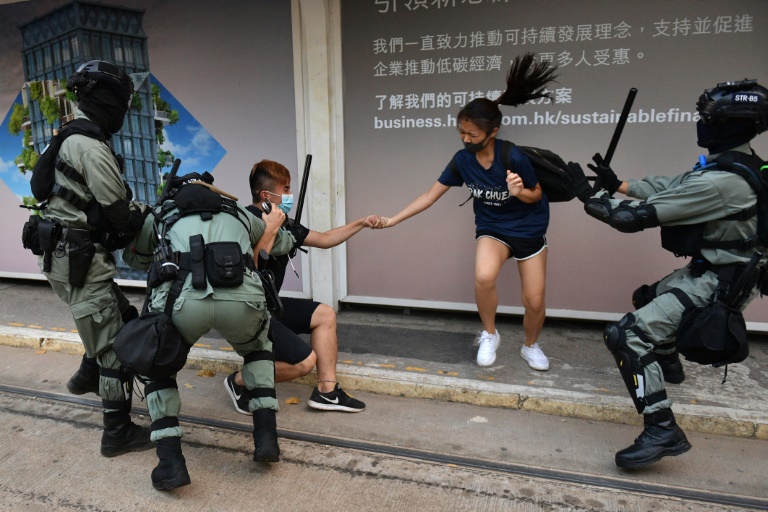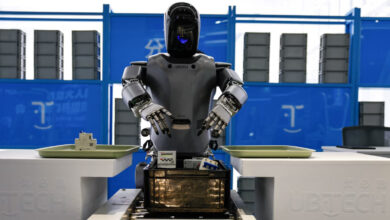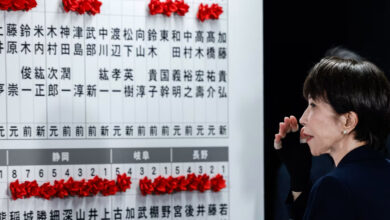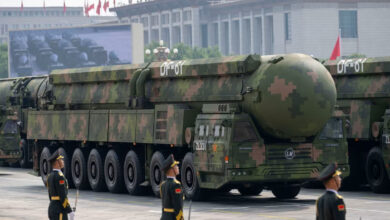
Masked pro-democracy protesters marched through Hong Kong in defiance of a ban on face coverings as much of the city ground to a halt on Saturday, with the subway suspended and many shops shuttered following another night of violence.
Hundreds of protesters staged unsanctioned marches and flashmob protests at multiple locations, a day after the city’s leader outlawed face coverings at protests invoking colonial-era emergency powers not used for half a century.
The latest acts of resistance came after a night of widespread chaos as hardcore protesters trashed dozens of subway stations, vandalised shops, built fires and blocked roads.
As the crowds were marching, city leader Carrie Lam released a stony-faced video statement in which she condemned protesters for “a very dark night”.
“We cannot allow rioters any more to destroy our treasured Hong Kong,” Lam said as she called on citizens to distance themselves from the more hardcore protesters.
Hosun Lee was among a crowd of demonstrators marching through Causeway Bay, a popular shopping district.
“The anti-face mask law is the first step,” he told AFP.
“If we don’t stand up and resist, then it could be that 2047 has already come,” he added, referencing the year semi-autonomous Hong Kong becomes fully part of the authoritarian Chinese mainland.
Some protests were light-hearted, even comical. In the harbourside district of Tsim Sha Tsui, a masked man walked dressed in a banana costume, the word “Revolt” emblazoned on its front.
But in Sheung Shui, close to the Chinese border, AFP reporters saw groups of masked protesters smashing the windows of businesses either owned by mainland Chinese entities or thought to be supportive of Beijing.
Police officers — many of whom had their faces covered and were not wearing identification numbers — were seen handcuffing one man who was wearing a mask in the commercial district called Central late Saturday afternoon.
Two others — a young man and a woman — were detained and questioned, but appeared to have been released.
Small crowds shouted “triads” at the officers as the people were put in police cars.
Months of chaos
Hong Kong has been battered by four months of increasingly violent pro-democracy protests.
The rallies were ignited by a now-scrapped plan to allow extraditions to the mainland, which fueled fears of an erosion of liberties promised under the 50-year “one country, two systems” model China agreed ahead of the 1997 handover by Britain.
After Beijing and local leaders took a hard line, the demonstrations snowballed into a wider movement calling for more democratic freedoms and police accountability.
Lam has refused any major concessions but struggled to come up with any political solution, leaving police and demonstrators to fight increasingly violent battles as the city tips into recession.
Hong Kong witnessed its worst clashes to date on Tuesday as China celebrated 70 years of Communist Party rule, with a teenager shot and wounded by police as he attacked an officer.
On Friday, Lam used a colonial-era law to ban face masks at protests, but it did little to calm tensions.
Instead, it triggered another wave of mass protests and vows of defiance.
“The government doesn’t listen to us. So we are upping our game,” said 32-year-old protester Nathalie, as hardcore demonstrators trashed a station in the previously calm neighbourhood of Tseung Kwan O.
In the northern district of Yuen Long, a plainclothes police officer opened fire when he was surrounded in his car and attacked by protesters, a petrol bomb exploding at his feet.
Local media reported a teenage boy was shot and wounded in the same district but police would not confirm whether the bullet came from the officer’s gun.
City grinds to a halt
Hong Kong’s subway network, which carries some four million people daily, remained out of action throughout Saturday, while major malls, Chinese banks and supermarket chains announced they were closing.
Even the ubiquitous 7-Eleven stores — which usually operate 24 hours — said they would shutter citywide later in the afternoon.
Long lines formed at supermarkets throughout the day as residents stocked up, many shelves quickly stripped of meat, rice, toilet paper and other essentials.
While the increased vandalism has shocked many in a city unused to such scenes, many more moderate activists say they still have sympathy for those using violence.
A 67-year-old property agent, who gave his surname Luk, was surveying the damage to his local subway station, its windows shattered and walls daubed with graffiti.
He said he opposed vandalism but wouldn’t condemn those trashing the station.
“The government will not make any concessions,” he told AFP. “The government isn’t having a dialogue with citizens, they are just pushing this one-sided behavior.”
A French resident, who gave his first name Marko, described the face mask ban as “adding oil to the fire”.
“But I think the people who destroyed the stations are extremists.”
Pro-China lawmakers and police have praised Lam’s ban. Beijing has also voiced support, calling it “extremely necessary”.
But critics said Lam’s move was a major step towards authoritarianism.
The emergency power, last used by the British in 1967, allows Lam to bypass the city’s parliament to make “any regulation whatsoever” during an emergency or moment of public danger.
Image: AFP / Nicolas ASFOURI Hong Kong police questioned a couple wearing face masks




